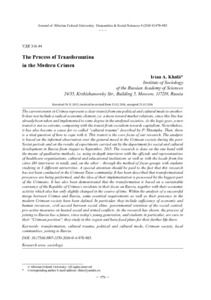Показать сокращенную информацию
The process of Transformation in the Modern Crimea
| Автор | Khalii, Irina A. | en |
| Автор | Халий, И.А. | ru_RU |
| Дата внесения | 2016-04-30T01:14:12Z | |
| Дата, когда ресурс стал доступен | 2016-04-30T01:14:12Z | |
| Дата публикации | 2016-04 | |
| URI (для ссылок/цитирований) | https://elib.sfu-kras.ru/handle/2311/20209 | |
| Аннотация | The current events in Crimea represent a clear transit from one political and cultural mode to another. It does not include a radical economic element, i.e. a move toward market relations, since this line has already been taken and implemented to some degree in the analyzed societies. As the logic goes, a new transit is not so extreme, comparing with the transit from socialism towards capitalism. Nevertheless, it has also become a cause for so called “cultural trauma” described by P. Shtompka. Then, there is a vital question of how to cope with it. This transit is the core focus of our research. The analysis is based on the informal observation over the general mood in the Crimean society during the post- Soviet periods and on the results of experiments carried out by the department for social and cultural development in Russia from August to September, 2015. The research is done on the one hand with the means of qualitative methods, i.e. using in-depth interviews with the officials and representatives of healthcare organizations, cultural and educational institutions as well as with the locals from five cities (84 interviews in total); and, on the other – through the method of focus-groups with students studying in 3 different universities. A special attention should be paid to the fact that this research has not been conducted in the Crimean Tatar community. It has been described that transformational processes are being performed, and the idea of their implementation is possessed by the biggest part of the Crimeans. It has also been demonstrated that the transformation is based on a sustainable constancy of the Republic of Crimea’s residents in their focus on Russia, together with their economic activity which also has only slightly changed in the course of time. Within the analysis of a successful merge between Crimea and Russia, some essential requirements as well as their presence in the modern Crimean society have been defined. In particular, they include sufficiency of economic and human resources, civil accord between social elites, governmental retention of the social control, pro-active measures on heated social and armed conflicts. As the research has shown, the process of joining to Russia has a future, since today’s young generation, and students in particular, are sure in their “Crimean position”: they study in this region and have fixed plans for their further life there | en |
| Аннотация | Происходящее ныне в Крыму есть очевидный транзит – от одного политического и культурного уклада к другому. Этот транзит не содержит в себе радикальной экономической составляющей – перехода к рыночным отношениям, поскольку такая установка уже воспринята и в какой-то степени реализована в рассматриваемых сообществах. В связи с этим новый транзит, казалось бы, не столь радикален, сколь транзит от социализма к капитализму. Однако, очевидно, и он вызывает к жизни «культурную травму, о которой писал П. Штомпка. Возникает необходимость её преодоления. Этот транзит и находится в фокусе данной статьи. Анализ основан на неформальном наблюдении за настроениями крымского общества в постсоветские годы и на результатах полевых исследований, осуществленных сектором по изучению социокультурного развития регионов России в августе-сентябре 2015 г. Работа осуществлялась качественными методами: в виде глубинных интервью с представителями власти, образовательных и медицинских организаций, учреждений культуры, а также с местными жителями в пяти городах Крыма (всего 84 интервью), а также в форме фокус-групп со студентами вузов (3 единицы). Следует особо отметить, что исследование не проводилось в крымско-татарском сообществе. Показано, что трансформационные процессы осуществляются и инициатива их реализации принадлежит большей части крымского общества. Показано, что трансформация опирается на устойчивое постоянство граждан Республики Крым в их ориентации на Россию, а также на их экономическое поведение, также слабо изменявшееся на протяжении многих лет. В анализе успешности вхождения Крыма в состав России выявлены необходимые для этого условия и их наличие в современном обществе Крыма. К ним относятся достаточность экономических и человеческих ресурсов; гражданское согласие среди элит общества; удержание государством социального контроля, упреждение острых социальных конфликтов и вооружённых столкновений. Исследование показало, что у присоединения Крыма к России есть будущее, поскольку современная крымская молодёжь, особенно студенты, твёрдо стоят на «крымских позициях» – учатся и планируют здесь остаться в будущем | ru_RU |
| Язык | en | en |
| Издатель | Сибирский федеральный университет. Siberian Federal University | en |
| Является частью серии | Журнал Сибирского федерального университета. Гуманитарные науки. Journal of Siberian Federal University. Humanities & Social Sciences;2016 9 (4) | en |
| Тема | transformation | en |
| Тема | cultural trauma | en |
| Тема | political and cultural mode | en |
| Тема | Crimean society | en |
| Тема | local communities | en |
| Тема | joining to Russia | en |
| Тема | трансформация | ru_RU |
| Тема | культурная травма | ru_RU |
| Тема | политический и культурный уклад | ru_RU |
| Тема | крымское общество | ru_RU |
| Тема | местные сообщества | ru_RU |
| Тема | присоединение к России | ru_RU |
| Название | The process of Transformation in the Modern Crimea | en |
| Альтернативное название | Трансформационный процесс в современном Крыму | ru_RU |
| Тип | Journal Article | |
| Тип | Published Journal Article | |
| Контакты автора | Khalii, Irina A.:Institute of Sociology of the Russian Academy of Sciences 24/35, Krzhizhanovsky str., Building 5, Moscow, 117218, Russia; E-mail: illaio@yandex.ru | en |
| Контакты автора | Халий, И.А.:Институт социологии Российской академии наук Россия, 117218, Москва, ул. Кржижановского, 24/35, 5 | ru_RU |
| Страницы | 978-985 |

